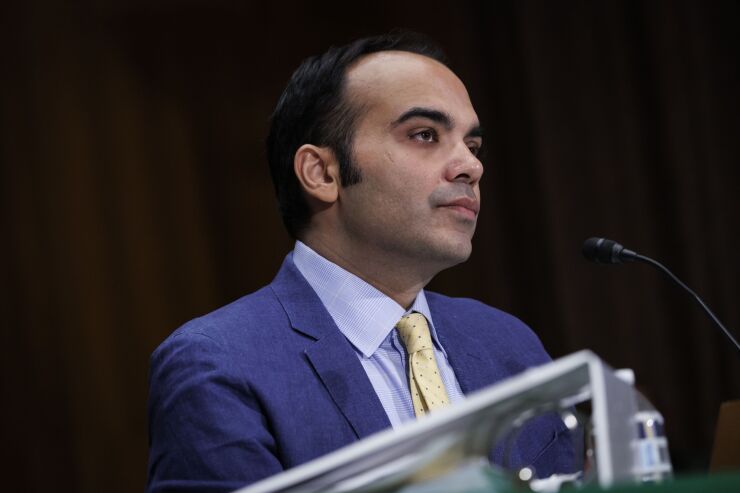
The incoming Trump administration could face an early political dilemma if it seeks to kill the Consumer Financial Protection Bureau's final rule slashing overdraft fees to $5.
President-elect Trump and
"The big question is whether the populism JD Vance has shown when it comes to financial services policy will be reflected in the Trump administration's priorities," said Jonah Crane, a partner at Washington, D.C.-based advisory and investment firm Klaros Group. "Limitations on overdraft are probably pretty popular, and the congressional calendar is quite crowded."
Industry sources say that bank lobbyists are not going to press Congress to overturn the overdraft rule. Republicans are widely expected to use the Congressional Review Act to attempt to repeal some CFPB rules, including the CFPB's recently finalized rule on
The Congressional Review Act allows Congress to nullify a rule with a simple majority as long as action is taken within the first 60 legislative days of the rule being finalized, when the Senate's filibuster rules do not apply. But House Republicans have
"There's going to be a lot of competition in the Senate for which rules get considered from various agencies, and floor time in the Senate is a scarce commodity," said David Silberman, a senior advisor at the Financial Health Network and a former acting deputy director at the CFPB. Analysts suggest congress will not act and will instead allow industry's legal challenge to wind through the courts.
Isaac Boltansky, managing director and director of policy research at BTIG, said the final overdraft rule has "procedural shortcomings and structural flaws" that give banks the edge.
Boltansky wrote in a research note that "despite the considerable amount of chatter about nullifying the rule via the Congressional Review Act," in the House and the Senate, "there are some political and procedural questions that warrant consideration on that front."
There are several ways the overdraft rule could be scuttled without congressional action.
Banks are confident a court will rule in their favor based on the legal arguments. Last week, four bank trade groups and three banks
Banks also are emboldened because of
In addition to the lawsuit, the Trump administration will appoint the next CFPB director, who can decline to defend the rule in court. The next director also could choose to repeal the rule through the rulemaking process, something that former CFPB Director Kathy Kraninger, a Trump appointee, did with
But there are other twists in the effort to repeal overdraft and other rules finalized in the final days of the Biden administration. Withdrawing the overdraft rule could leave the CFPB vulnerable to being challenged by consumer advocacy groups for being "arbitrary and capricious," a legal standard under the Administrative Procedure Act.
Federal agencies no longer benefit from automatic deference to their legal interpretations by the courts, which could impede some of the administration's efforts. In June, the Supreme Court overturned
Ronald M. Jacobs, a partner at the law firm Venable, said on a conference call last week to discuss the incoming administration's policies that under the Chevron doctrine, "the agencies could generally do what they wanted within reason, and it would be affirmed by the courts with the deference they were given.
"When you don't have that deference, what does that mean from the challenge perspective?" Jacobs said. "If you've got a regulation in place, maybe it's been upheld, or maybe not, from a judicial challenge. But if you suddenly decide you want to repeal that through notice-and-comment rulemaking, and then someone challenges the repeal, you're kind of potentially at a loss to say, 'Well, you know, we get the deference to do this.'"
Still, Boltansky thinks the rule will not go into effect as scheduled in October 2025.
"Ultimately, at a minimum, we expect the Trump CFPB will delay the effective date of this rule as it considers revisions or reversals," Boltansky wrote.






